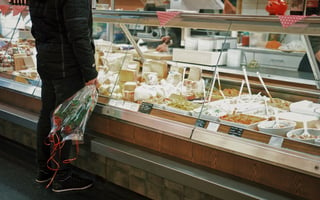Well, 2025 certainly hasn’t lacked news, has it?
Escaped bears sound like a dramatic and intense crisis comms scenario.
Not to mention terrifying.
And while it is not a scenario we have been asked to run during one of our crisis management tests, it is a situation one wildlife charity found itself facing for real.
Wildwood Devon has been at the centre of extraordinary media coverage after two European brown bears escaped from their enclosure.
Siblings Mish and Lucy broke out of their living quarters, triggering the wildlife sanctuary’s emergency protocols to kick into action.
But seemingly, the only danger the 30 stone bears posed was to the conservation charity’s food supplies.
In scenes that sound like they could have come from Winnie the Pooh, the wandering bears made a beeline for the honey store - where they ate a week’s supply.
And if that was not enough, they also made their way through peanut butter and all the bananas, apples, fresh food and vegetables from a delivery made an hour before they escaped.
Perhaps not surprisingly, Mish returned to his enclosure after an hour for a post-feast nap - we've all been there - while Lucy was coaxed back by workers ringing a recall bell.
The adventure has turned the bears into stars, with stories across the UK media, as well as coverage in the US, Canada and Australia.
Here’s a taste of the headlines:
Two young bears escape from an enclosure in Devon... and devour a week's worth of honey 🍯
— Sky News (@SkyNews) June 24, 2025
🔗 Read more https://t.co/hoMYCfLLpT
What could have been a dangerous situation – for people and the trust’s reputation - has turned into a sweet PR win for Wildwood Devon.
Its crisis comms have been timely and transparent. There has been plenty of action in what it has said – an internal investigation is underway. And there has been a focus on reassurance – the bears did not enter any public areas and “remained very calm throughout’.
You might say its response goes beyond the bear necessities of effective crisis media management.
It includes plenty of the CARE (Compassion, Action Reassurance and Examples) acronym we use during our crisis communication training courses.
During an interview with BBC Radio Devon, Mark Habben, the director of zoo operations at the charity, discussed the safety, apologised for the alarm the escape would have caused people, and reiterated how well emergency protocols had worked.
He said: “We are sorry it would have caused distress to anyone on site. Being chaperoned into a safe building isn’t what you would expect or hope for.
“We thrive on creating a safe environment for people and bears."
And he added: “We are grateful it ended so well and so professionally. And we’d like to thank everyone who has been so supportive.
“It is not what we want to happen.”
Mr Habben also went on to discuss the part of the story that has captured imagination.
“You can’t blame them,” he said.
“There is no hiding honey from a brown bear.
“They remain, to this moment, extremely content, very happy bears, with slightly less honey than they were afforded yesterday.”
He was also able to add context around what a week’s worth of honey for a bear looks like.
He said: “It’s so high in sugar, so we are very careful. But we do use it as a training tool for a reward on the recall training.
“What I would consider a week’s worth of honey for a brown bear and what a zookeeper might consider it to be might vary depending on how good the bears have been.
“But it is certainly a couple of jars worth at least, I would imagine, and some peanut butter, I have subsequently found out, as well.
And he answered the burning question - how did the bears get the lid off the honey jar?
“The honey arrives in large plastic tubs, which are not as impenetrable as you might imagine to a brown bear.
“Ripping a plastic tub apart was probably pretty easy for them. “
The interview would have been different had the escape not ended so happily.
Nevertheless, it is a warm, conversational interview that hits the right tone, has touches of humour and adds to the fascination around the story.
And it fits in with how the charity has handled the story.
Over the past few days, Mish and Lucy have certainly made headlines, not just here in Devon, but around the world. While the situation was unexpected, we're incredibly grateful for the outcome and for the smiles it's brought to so many faces.
— Wildwood Devon (@WildwoodDevon) June 25, 2025
We want to thank our local community… pic.twitter.com/16n0sxhnrF
While the extent of the media interest could have felt overwhelming as interest grew, the charity appears to have embraced the attention.
I’ve seen different spokespeople named in stories and plenty of variety in the quotes.
And CCTV footage capturing what the bears got up to during their escape has been shared with the media.
There has even been an endearing follow-up to the story, with the Trust reporting its ransacked honey supply had been replenished by donations.
Mr Habben told the BBC: "I think everyone's picked up on the fact bears really do love honey - we've had donations including a 15kg (33lb) tub."
Alongside the crisis communication lessons contained in the story, it is also a reminder of the media’s appetite for the unusual and the heartwarming amid the seemingly endless doom and gloom of the news cycle.
There’s a need for stories that offer relief and hope.
“I think it is what people need at the moment with so much going on,” Mr Hannem told BBC Radio Devon.
And we couldn’t put it any better than that.
Media First are media and communications training specialists with nearly 40 years of experience. We have a team of trainers, each with decades of experience working as journalists, presenters, communications coaches and media trainers.
Click here to find out more about our media training and crisis communication courses.
Subscribe here to be among the first to receive our blogs.
*Photograph courtesy of Wildwood Trust.





